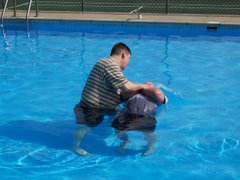No matter how hard I try, I cannot understand the approach to moral issues that the Rev. Al Sharpton continues to take in the national press and political arena. In a
guest commentary on CNN.com yesterday, Sharpton called African-American pastors across the country to task for taking strong stands against abortion and gay marriage while apparently ignoring the pervasive issue of racism. At first glance, Sharpton appeared to be calling pastors to task for an imbalanced approach to ministry. After all, as Christians we cannot have pet sins that we preach against (gay marriage) while ignoring other sinful issues (racism, oppression) that affect the world in which we live on just as grand a scale. If that was the intent of Al Sharpton, you would find me first in line to give a hearty "Amen!" to his commentary. As the article progresses, however, it becomes obvious that the intent of Sharpton's barbs toward his fellow African-American pastors was not to call for balance, but to call for
silence.
After chastising these conservative pastors for daring to "deny a woman's right to choose," and claiming that such a position is a "narrow scope of belief" which is in the minority amongst African-American pastors, Sharpton further levels the charge that these pastors are using their theological convictions to drive a wedge through his "people" (his word, not mine). The point he made is clear, African-American pastors should not address the issues of abortion and gay marriage if speaking to those issues threatens the existence of a unified front against racism in the United States (which I will be the first to admit remains prevalent). Rather, according to Sharpton, black pastors should focus on the issues of "dire importance to the black populace as a whole" which are racism, poverty, and equality at the ballot box.
If you have seen my blog picture, you are aware of the fact that I am not a black preacher. The fact that I am an Anglo-American will lead some to conclude that I have no right to interject myself into this discussion. I disagree for two primary reasons. First, I (and other Christians) should stand with our brothers in Christ who refuse to remain silent on issues that threaten the very moral fabric of our nation. In this respect, Al Sharpton is using his theological stance in an attempt to drive a wedge between
my people, the body of Christ. I will not remain silent as he attempts to do so.
Second, as someone who spent his formative years in several housing projects, I am well qualified to speak of the social evils of poverty and racism. I know what it is to be poor (my divorced parents frequently struggled to provide the basic necessities for their three children). I have seen first hand how poverty affects young children at every level of their existence and undermines their efforts and ability to overcome their circumstances. I have also been the recipient of racism (although Cornell West and Spike Lee would deny my ability to experience true racism because I am white). As a child there were a couple of significant occasions when circumstances forced my family into dilapidated housing projects in which we were one of two or three white families in a predominantly black area. Even though I was a child, I grew to appreciate what it meant to be excluded, insulted, assaulted because I was in the racial minority. My experience led me to hate racism with a vehemence that has not diminished one iota in twenty plus years. It also gave me a unique perspective among my peers when we studied the Civil Rights movement in high school. I understand and affirm the need for continued diligence in the fight against poverty and racism in our country. I believe more white pastors should take stands against these forms of oppression in keeping with the ethic revealed in Scripture. We must, however, resist the temptation to address the social ills which affect us the most while ignoring other areas addressed by the Bible. This approach is exactly what Al Sharpton advocates in his rebuke of conservative, black pastors. Sharpton wants them to speak up on the issues of racism, poverty, and voting rights, but not to address the murder of innocents or assaults on the family.
If Rev. Sharpton was applying his hermenutics of God's Word consistently, he would see that the same Scriptures that led Dr. Martin Luther King, Jr. to fight to end the shackles of racism also call for all of us to defend the lives of those who cannot defend themselves, namely unborn children. The same Scriptures that compelled King to confront evil in the culture, still speak and compel men of God today, which is why we cannot remain silent on issues such as abortion or gay marriage (which threatens to undermine marriage and the family as we know it). While Sharpton has persistently attempted to paint King as one who would have defended a woman's right to abortion and opposed the war against terrorism in Iraq, the truth is we do not know how King would have responded to either of those issues. The prevalence of abortion on demand and the threat of terrorism were not even on America's radar screen during King's ministry.
Without addressing the fallacious nature of comparing the gay rights movement with the Civil Rights movement, I would instead like to ask the Rev. Sharpton why he does not consider abortion to be a "dire" problem facing the black community today. An excellent
article on CNSNews.com reveals the negative impact abortion has had and continues to have on the black populace today. For example, since Roe v. Wade, over fourteen million African-American babies have been "terminated" prior to birth, a death rate of
genocidal proportions." Since 1973, more than twice as many blacks have died from abortion than from heart disease, cancer, accidents, violent crimes and AIDS combined; Blacks make up about 12 percent of the population in the United States but account for 32 percent of the abortions; and about 1,450 black infants are aborted every day in this country." Why is Al Sharpton not speaking up on behalf of these oppressed infants that cannot speak for themselves? Why does he remain silent when Planned Parenthood intentionally places a majority of their abortion clinics (62.5%) in communities with a higher percentage of blacks than that particular state as a whole? Does racism somehow trump murder? The answer is no. Should we remain silent on racism? Again, the answer is no. But neither should we remain silent on the issue of abortion. By doing so, Al Sharpton has stood passively while the enemy has worked to deplete the ranks of those who would otherwise stand with him in the fight to end racism.
If Al Sharpton really wants to see an end to racism in this country, he should return to a consistent application of the Scriptures, take a stand with evangelicals, and defend the civil rights of
all African-Americans in this country, not just the ones who safely make it out of the womb.
As I read this article, I began to realize that many use the word "people" with differing connotations. Some use the word "people' to refer to specific ethnic or racial group. Others, such as myself, are convinced it is more important to identify with the "people of God" than any other group. Al Sharpton's employment of the word leads me to question whether his "people" are African-Americans or the Democratic party.
Al, it is time to submit your political views to Scripture and not vice versa.
I look forward to your comments.
Chris





